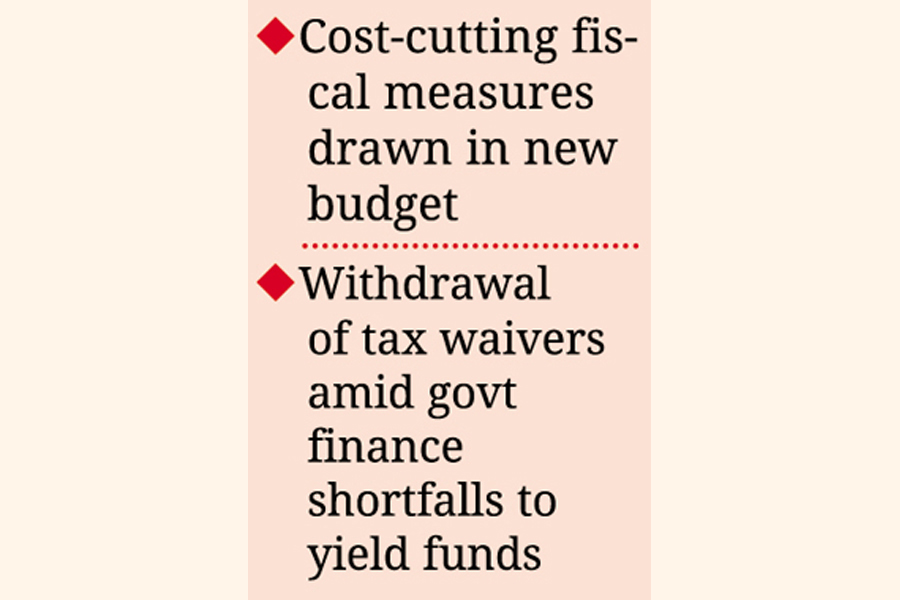Tax expenditures targeted down by Tk 150b in FY25
Tight-fisting on high cost in foregone revenues

Published :
Updated :

Direct-tax expenditure in terms of foregone revenues may shrink by Tk 150 billion in the upcoming fiscal year with the bundling out of numerous exemptions from major sectors that include physical-infrastructure construction.
As per National Board of Revenue (NBR) estimate, tax expenditure of the income-tax wing would get reduced to Tk 1.63 trillion in the fiscal year 2024-25 against Tk 1.78 trillion or 3.56 per cent of the country's GDP in the current year, officials said.
However, the TE would be still 2.91 per cent of the GDP in the upcoming fiscal
The tax expenditure in FY 2021-22 was Tk 1.26 trillion while Tk 1.37 trillion in FY 2022-23.
The share of tax expenditures made on account of corporate taxpayers was 68 per cent of the total tax benefits worth Tk 1.26 trillion enjoyed by all taxpayers in the 2020-21 fiscal.
Direct-tax expenditure is defined as rebates, discounts, exemptions, cutbacks, and the exclusion of income from computing total taxable income. It is termed 'a form of tax subsidy', which, if collected as tax, would have augmented the total tax-revenue amount.
The NBR estimates the TE following revenue-foregone method as recommended by the OECD.
Finance Minister Abul Hassan Mahmood Ali is set to place the estimate of reduced tax-expenditure data in budget speech on June 6, 2024.
Economist Dr Masrur Reaz, the founder and chairman of Policy Exchange Bangladesh, says it's imperative to review and rationalise tax expenditure as the government is in dire need of mobilising higher domestic revenue for development pending.
"Industries enjoying tax exemptions for decades must come under tax net," he adds.
He, however, recommends tax benefit for new and potential industries by fixing a specific time to phase out.
A senior NBR official has said the volume of TE has been calculated on the basis of a benchmark set under a methodology by TE committee.
The NBR has considered two principles in defining benchmark: the standard tax treatment applicable to similar taxpayers or nature of activities, and longstanding features and structural components of the tax system.
A report of GTED Flagship (Haldenwang, et al., 2021) said regional average of revenue foregone as a percentage of GDP was 2.1 per in South Asia in 1990-2020.
Average of revenue foregone by low-income countries is 26.3 per cent, followed by lower-middle-income countries 20.3 per cent, upper-middle- income countries 25.5 per cent and 24.7 per cent in high-income countries.
In a report, the NBR says predominant objectives associated with TE measures are threefold: to expedite the process of industrialisation, to boost exports and foreign direct investment to bring in foreign currency, and to safeguard social security and welfare of low- and modest-income groups.
In the first TE report in 2006, the country's TE was Tk 93.45 billion in 2005, of which direct TE was Tk 10.28.
In Bangladesh, some 35,000 corporate taxpayers submit tax returns annually while the number of individual taxpayers submitting return is 4.1 million.
The NBR report says microfinance sector enjoyed the highest tax benefit worth Tk 153.15 billion in FY2020-21, accounting for 18 per cent alone of the total TE offered to the corporate sector.
On personal tax, remittance earners enjoyed the highest tax benefit worth Tk 112.87 billion that occupied 18 per cent of total tax exemptions provided to the individual categories of taxpayers.
Of the tax bounties, corporate taxpayers availed Tk 853.14 billion, equivalent to 2.41 per cent of GDP, while personal income tax Tk 404.98 billion or 1.15 per cent of GDP.
Apart from microfinance, power and energy sector availed tax benefit worth Tk 83.80 billion followed by economic zones and hi-tech industries Tk 46.11 billion in the category of corporate taxpayers.
Garment, textiles and accessories sector shared Tk 34.37 billion, ICT sector Tk 14.77 billion, and poultry-fisheries Tk 1.43 billion.
On PIT, poultry and fisheries businessmen availed Tk 29.85 billion in tax benefits while capital-market investors Tk 9.65 billion in the form of capital gains derived from investment in shares.
Bangladesh's tax-to-GDP ratio is one of the lowest in the world, around 8.0 per cent, due mainly to high TE that has contributed to budget deficit and increased government debts.
The NBR has prepared the TE report following conditions coming from the International Monetary Fund (IMF) against disbursement of its credit support from a US$4.7-billion package that prescribes reforms deemed overdue.
doulotakter11@gmail.com


 For all latest news, follow The Financial Express Google News channel.
For all latest news, follow The Financial Express Google News channel.